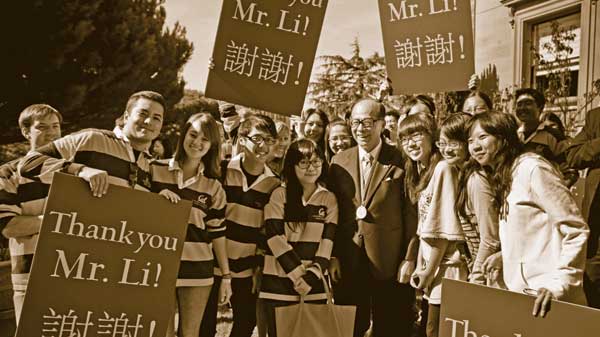The typical ultra-high net worth (UHNW) philanthropist donates some US$25 million to sundry good causes over the course of their lifetime. While it’s a huge sum, for the vast majority, it’s often way less than 10 percent of their total assets. Even so, it’s an act of altruism, a worthy disinterested gesture in a world where such acts of kindness are rare indeed, right? Well…
At a time when everything from the media (social and otherwise) to celebrity and from fashion to ethnic faction has been weaponised, co-opted by causes of various worth and retooled in line with what reality really isn’t (or shouldn’t be), is it perhaps folly to think philanthropy could remain immune?

Pinpoint Philanthropy
Gone are the days of laissez-faire largesse. Today’s more diligent dosh-dispensers want to know exactly where what they are giving is going. In line with this, corporations are far less inclined to sprinkle strings-free sums across the communities in their immediate vicinity, topping up the funds of local schools or making the bank balances of proximate hospices a little healthier. Instead, such funding is being funnelled towards foundations dedicated to facilitating said corporation’s long-term goals.
In the case of Microsoft and Toyota, for instance, this has seen the two high-tech behemoths steer all their corporate social responsibility (CSR) cash towards backing the kind of science, technology, engineering and mathematics (STEM) educational programmes set to churn out would-be workers with just the right skills to staff their future production lines.

The Charity Vote
Not so long ago, Capitalism with a Conscience was seen as likely to end all the world’s ills, with the wealth trickling down from the globally most-haves to the far more frequently-found most-needs set to Make Poverty History, while leaving no super-richee with an unsalved conscience. That’s what it pretty much said on the press release anyway.
In practice, under the guise of giving, many of the world’s most well-heeled have actually diverted their divestibles towards steering the ship of state in the direction that best suits their longterm personal profitability. Hence, it’s lobbyists, candidates and oftopaque ‘think tanks’ that find themselves in receipt of million-dollar donations rather than Nepal’s least-well resourced leprosy alleviation facility or the West Minsk Home for the Physically Challenged and The Terminally Crotchety.
One of the issues here is that, where once think tanks were funded to identify and solve the world’s most pressing problems, now they’re more likely to be bankrolled to churn out bogus studies, which either align with the aims of their benefactors or counter the claims of those that don’t. No doubt, a few quid also goes to keeping “wealth disparity” off the must-resolve list of legislators everywhere.

Benefishy
Back in 2015, the infamous Panama Papers became inexplicably public, giving the wider world an unexpected insight into how one Central American legal firm – Mossack Fonseca – had done way more than most when it came to fabricating bogus bestowals on the part of the fabulously wealthy. With the ultimate self-serving beneficiaries buried within a labyrinthine legalish structure, not only could the mega-rich have their cakes and eat them, they could render all such analogous comestibles wholly tax-deductible.
Fast forward four years, 23 jurisdictions have jointly recovered some US$1.2 billion in sneakily sequestered taxes, while many money-laundering miscreants are now settling into serious stretches of penal servitude and Mossack Fonesca is no more. A practice curtailed? The little smart money still in circulation is not being wagered on that, with the publication of the British Virgin Island Volumes, the Luxembourg Letters or the Guernsey Grimoires almost daily anticipated.

Ego-nomics
So, is all philanthropy really nothing but fancily packaged fraud, with the donor and the beneficiary, if not as one, in all likelihood joined at the metaphorical hip? Despite the old adage, can money actually buy you everything – respect, gratitude, your own way and even redemption – you could possibly crave? Well, as perhaps a tiny hint of consolation, when it comes to redemption, at least, the tide may be turning, even if only by a trickle.
Just recently, for instance, a charity dedicated to providing free education to impoverished Haitians sent back a US$100,000 cheque to Robert Kraft, the 77-year-old owner of the New England Patriots football team, who is currently facing trial on two charges of soliciting prostitution. Clearly not wanting to be tainted by the funds nor to play any part in restoring Kraft’s respectability, the head of the charity admonished: “We cannot do good by doing bad. The end cannot justify the means.”

Despite such small victories, though, the world of philanthropy is far murkier than it might first appear. It is, of course, possible to argue that, no matter what the true motive, doing good is still doing good, and should the donor and the beneficiary both benefit, well that’s hardly the end of the world. But it’s harder to find a plus, when the supposed recipient is either mythical or merely the cheque-signer themselves with a curly wig and big glasses.
While we can all nod at the home-spun wisdom that “charity begins at home”, it’s an axiom that becomes all the less palatable when that home turns out to actually be a second or even third home, with a swimming pool, a helipad and a taxman kept very much in the dark.
Text: Bailey Atkinson
For the full article, please find the latest issue of Gafencu’s print magazine or the PDF version on the Gafencu app. Download the app from the Google Play Store or Apple App Store.



